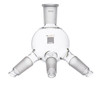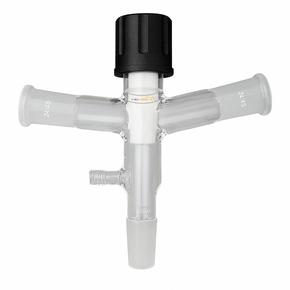
Helios
Short Path - Triple Neck Cow Short Path 24/40
Short Path – Triple Neck Cow Receiving Flask (24/40)
Multi-Port Distillation • Precision Lab Glassware • High-Capacity Collection
Description
The Short Path Triple Neck Cow Receiving Flask is a high-performance piece of glassware designed for efficient short path distillation and advanced compound separation. With three 24/40 standard ground joints, this flask allows seamless connection to multiple receiving flasks—enabling fraction collection without interrupting your workflow.
Available for 2000ml or 5000ml flask sizes, this is ideal for medium to large-scale distillation setups. made from durable borosilicate glass, it withstands high temperatures, vacuum pressures, and corrosive chemical exposure, ensuring safe, repeatable results in demanding laboratory environments.
Key Features
-
Triple 24/40 necks for connecting up to 3 receiving flasks
-
Streamlines fraction collection during short path distillation
-
Durable borosilicate glass construction
-
Compatible with standard lab distillation setups
-
Excellent thermal and chemical resistance
-
Available for 2000ml and 5000ml capacities
-
Ideal for scaling up distillation or separation processes
Product Specifications
-
Material: Borosilicate glass
-
Joint Type: 3 × 24/40 ground glass joints
-
Capacity Options: 250ml / 500ml / 100ml / 2000ml
-
Shape: Triple neck “cow” receiver flask
-
Compatibility: Standard short path distillation systems
-
Temperature Resistance: High heat tolerance
-
Chemical Resistance: Excellent
Typical Applications
-
Short path distillation with multiple fraction collection
-
Botanical separation and refinement
-
Laboratory compound isolation and purification
-
Fractional distillation in research and development
-
Educational and industrial chemistry settings
Notes for Use
-
Always secure flask with appropriate lab stands and clamps
-
Ensure ground glass joints are lubricated and sealed properly
-
Use only with compatible 24/40 receiving flasks
-
Clean thoroughly after each use to prevent cross-contamination

Short Path - Triple Neck Cow Short Path 24/40
Short Path – Triple Neck Cow Receiving Flask (24/40)
Multi-Port Distillation • Precision Lab Glassware • High-Capacity Collection
Description
The Short Path Triple Neck Cow Receiving Flask is a high-performance piece of glassware designed for efficient short path distillation and advanced compound separation. With three 24/40 standard ground joints, this flask allows seamless connection to multiple receiving flasks—enabling fraction collection without interrupting your workflow.
Available for 2000ml or 5000ml flask sizes, this is ideal for medium to large-scale distillation setups. made from durable borosilicate glass, it withstands high temperatures, vacuum pressures, and corrosive chemical exposure, ensuring safe, repeatable results in demanding laboratory environments.
Key Features
-
Triple 24/40 necks for connecting up to 3 receiving flasks
-
Streamlines fraction collection during short path distillation
-
Durable borosilicate glass construction
-
Compatible with standard lab distillation setups
-
Excellent thermal and chemical resistance
-
Available for 2000ml and 5000ml capacities
-
Ideal for scaling up distillation or separation processes
Product Specifications
-
Material: Borosilicate glass
-
Joint Type: 3 × 24/40 ground glass joints
-
Capacity Options: 250ml / 500ml / 100ml / 2000ml
-
Shape: Triple neck “cow” receiver flask
-
Compatibility: Standard short path distillation systems
-
Temperature Resistance: High heat tolerance
-
Chemical Resistance: Excellent
Typical Applications
-
Short path distillation with multiple fraction collection
-
Botanical separation and refinement
-
Laboratory compound isolation and purification
-
Fractional distillation in research and development
-
Educational and industrial chemistry settings
Notes for Use
-
Always secure flask with appropriate lab stands and clamps
-
Ensure ground glass joints are lubricated and sealed properly
-
Use only with compatible 24/40 receiving flasks
-
Clean thoroughly after each use to prevent cross-contamination








